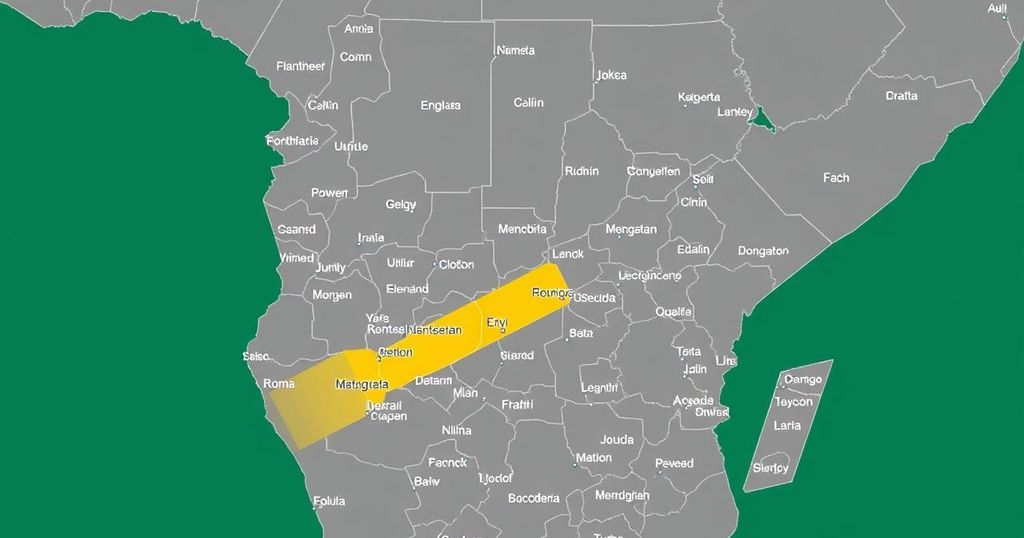Opposition Claims Election Fraud Amidst Mozambique’s Presidential Vote
Venancio Mondlane, an independent candidate, alleges that he is the victim of significant electoral fraud in Mozambique’s presidential elections, characterized by systematic manipulation by the ruling FRELIMO party. Official counts proclaim FRELIMO’s candidate, Daniel Chapo, as the victor; however, opposition parties demand a thorough investigation into the alleged malpractice, which includes irregularities both domestically and abroad, particularly involving Zimbabwean nationals voting illegally in favor of FRELIMO.
In Mozambique, the ongoing presidential election has sparked significant controversy, particularly surrounding accusations of electoral fraud from the opposition parties. The Liberation Front of Mozambique (FRELIMO), which has maintained its power for nearly half a century, is projected to secure victory with its candidate, Daniel Chapo, leading in the polls. Opposition candidate Venancio Mondlane, who ran independently after departing from the Renamo party, claims that he emerged as the true victor of the elections, alleging widespread fraud in the process. Mondlane articulated his concerns to the media, asserting that the current election rigging is unprecedented, and reflective of similar irregularities seen in prior elections. Official reports indicate that FRELIMO’s Daniel Chapo has received approximately 53.68% of the votes in the capital, with Mondlane trailing at 33.84%. Additionally, in the conflict-ridden Cabo Delgado region, results similarly show Chapo leading with about 66% of the vote. Observers note a concerning trend for Renamo, which may lose its position as the principal opposition party to Podemos, a newer political entity that has aligned with Mondlane. Analysts express that this shift could significantly impact the political dynamics of Mozambique. Both Renamo and its representatives assert that FRELIMO’s administration engaged in systematic electoral malpractice. Allegations include inadequate oversight during the voting process, as well as the strategic removal of voters’ names from registry lists in districts that typically favor Renamo. Renamo’s candidate for governor in Zambezia has embarked on an international campaign to draw attention to these claims, stating that logistical hindrances orchestrated by electoral officials hampered the integrity of the vote. Moreover, irregularities have surfaced regarding votes cast abroad, particularly in Zimbabwe, where thousands purportedly voted inappropriately without official Mozambican documentation, allegedly encouraged by Zimbabwe’s ruling Zanu-PF party. Reports indicate that members of Zanu-PF openly claimed participation in the Mozambican elections to support FRELIMO, thus raising serious questions about the legitimacy of the electoral process. These developments underscore the need for a comprehensive investigation into the overall integrity of the election.
The political landscape in Mozambique has been dominated by FRELIMO since the country achieved independence in 1975. The current election cycle has witnessed heightened tensions, particularly with the emergence of new political alliances and independent candidates that challenge the traditional power dynamics. The history of conflict between FRELIMO and Renamo, stemming from a brutal civil war, continues to resonate in the political environment, contributing to allegations of electoral fraud and manipulation. Furthermore, external influences from Zimbabwe’s ruling party highlight potential cross-border electoral interference, complicating the perception of fairness in Mozambique’s elections.
The 2024 Mozambican presidential election has revealed deep divisions and accusations of electoral malpractice, centering especially on FRELIMO’s governing tactics. The claims of fraud articulated by opposition leaders underscore a troubling pattern of electoral irregularities that could reshape Mozambique’s political future. As the legal and investigative processes unfold, the integrity of Mozambique’s electoral system remains under scrutiny, with potential implications for democratic governance in the region.
Original Source: www.dw.com




Post Comment